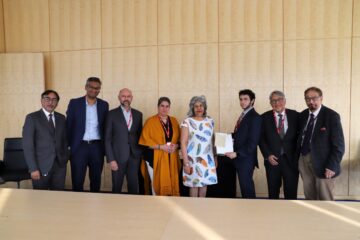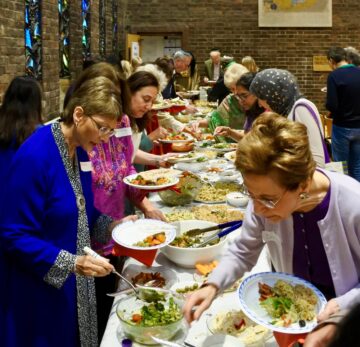Professor Azim Nanji, Director of The Institute of Ismaili Studies, delivered the prestigious 2004 Birks Lectures hosted by McGill University’s Faculty of Religious Studies in February 2004. Speaking on Islam, its understanding, representation and study, Professor Nanji explored the ways in which Muslims and non-Muslims through the ages have looked at the world’s second largest religion.
‘I don’t know if any culture is best studied in its moment of crisis,’ said Professor Nanji in the first of two lectures delivered as part of the annual lecture series at McGill University’s Birks Chapel. Addressing a full audience of faculty and students on ‘The Study of Islam: Past, Present and Future,’ Professor Nanji argued that much of what has been presented to Western audiences about Islam in recent years, especially through sources of mass media, has been through the filter of the events of September 11, 2001.
Focusing on how Islam has been studied, understood and negotiated by others, Azim Nanji navigated through history citing examples from the past, including the demonising of Muslims by Christian Crusaders who saw them as heretics, and the Colonial European penchant for artefacts from Muslim lands. In more recent times, early attempts at teaching Islam at the university level focused on textual traditions of Muslim societies, oftentimes privileging Arabic and Persian to the other languages of the Muslim world. By doing so, it meant that many aspects of the Muslim world were ignored.
In the contemporary world, the amount of activity and research on the Muslim world is significant. However, because many Islamic Studies programmes are located within the auspices of regional and area studies, much of this works lacks direction and coherence. Islam, said Nanji, needs to go beyond sitting at the periphery of scholarly enquiry and be seen as an integral part of the history of human civilisations — not simply as an exotic phenomenon of the past or a threatening dimension of global contemporary life.
In his second talk, ‘Islam to and from Insiders, Islam to and from Outsiders: Between and Beyond Dichotomies,’ Azim Nanji asked where in the vocabularies and historical memories of Muslim communities are there the tools to negotiate difference and pluralism? Examining models of engagement between Muslims and other faith communities, Professor Nanji urged those present to explore the engagement of religions traditions with the modern world in comparative frameworks, rather than looking at individual religious communities in isolation.
Supplementing this, Professor Nanji also explored the ways in which Muslims have talked about their own histories and historical representations, pointing to the diversity of interpretation and pluralism of thought within the Muslim umma.
Through the generosity of the late William M. Birks, an annual series was established in 1950. The first lecturer was the Right Reverend Leslie Hunter. More recent lecturers have included Huston Smith, Northrop Frye, Wilfred Cantwell Smith, Gregory Baum, Jurgen Moltmann, Robert McFee Brown, Krister Stendahl, James Barr, Charles J. Adams, John H. Hick, Jon Levenson and David Little.






